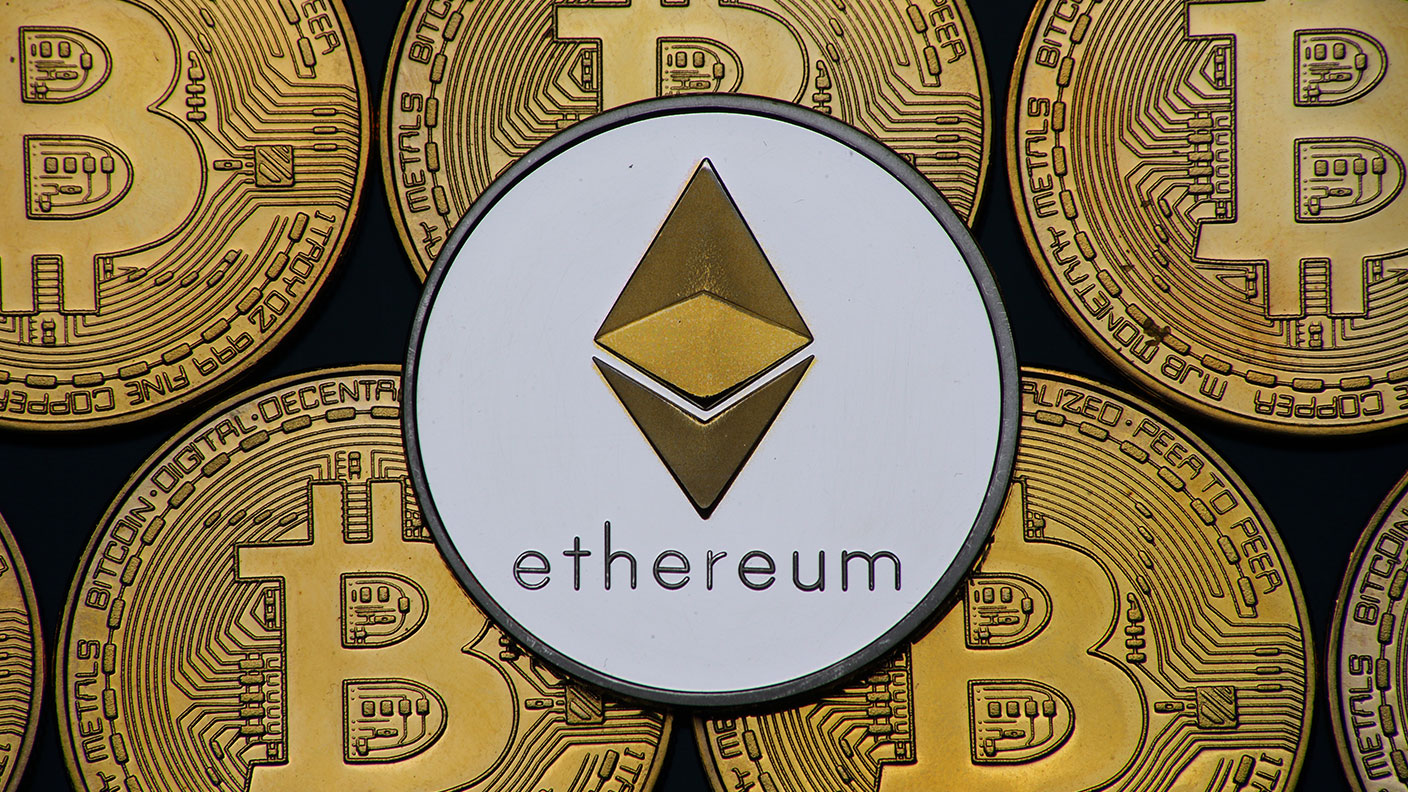Key update could send cryptocurrency ether even higher
A technical change could see ether, the world’s second-favourite cryptocurrency – already up by 600% in the last year – soar even higher. Saloni Sardana explains the reasons behind the change.


Get the latest financial news, insights and expert analysis from our award-winning MoneyWeek team, to help you understand what really matters when it comes to your finances.
You are now subscribed
Your newsletter sign-up was successful
Want to add more newsletters?

Twice daily
MoneyWeek
Get the latest financial news, insights and expert analysis from our award-winning MoneyWeek team, to help you understand what really matters when it comes to your finances.

Four times a week
Look After My Bills
Sign up to our free money-saving newsletter, filled with the latest news and expert advice to help you find the best tips and deals for managing your bills. Start saving today!
Cryptocurrency prices, which have swelled in value over recent months, just received another unusual boost: a change in the number of “ether”, the tokens used on the Ethereum blockchain, reports Bloomberg. Ether is the second biggest cryptocurrency by market cap, lagging only behind the world’s most popular cryptocurrency, bitcoin.
Crypto-sceptics may argue whether ether really needed another boost – it is up by more than 600% in the last year alone, with bitcoin up by around 460% in the same period, despite bitcoin being endorsed by a number of high profile billionaires, including the one and only Elon Musk (who revealed last month that his company Tesla had bought more than $1.5bn worth of bitcoins), and a wave of institutional investors piling in.
So, what are ether and Ethereum and why have they done so well? The terms ether and Ethereum are often used interchangeably, but a slight difference exists. Ethereum is the decentralised blockchain platform technology, which uses ether (ETH) as its own native cryptocurrency. Ether can be considered the fuel that is required to power the network, with Ethereum acting as the network itself. Ethereum shot to fame for its ability for developers to execute “smart contracts” on its network. Like all blockchains, the Ethereum blockchain is widely considered to be immune to cyber hacks and, once settled, transactions cannot be modified. Ether’s supply is growing approximately by around 10% a year.
MoneyWeek
Subscribe to MoneyWeek today and get your first six magazine issues absolutely FREE

Sign up to Money Morning
Don't miss the latest investment and personal finances news, market analysis, plus money-saving tips with our free twice-daily newsletter
Don't miss the latest investment and personal finances news, market analysis, plus money-saving tips with our free twice-daily newsletter
Ether’s infinite supply problem explained
Until now, ether’s supply was considered to be infinite – in a stark contrast to bitcoin, which has a fixed supply of 21 million coins. Bitcoin cannot grow beyond this number and, once this amount has been mined, no more bitcoins can ever be produced. Of course, there is the remote chance that bitcoin’s protocol could be changed and the supply limit raised, but for simplicity we won’t go into that today.
Ether’s limitless supply, say some developers, is causing havoc with transaction charges. When you make a transaction with any cryptocurrency, you have to pay for it to be settled, or added to the blockchain. The fees for ether (called “gas”) fluctuate wildly, and users could only guess how many tokens an ether transaction would use, hampering the network’s usability.
What EIP 1559 proposes
But, says Bloomberg, the proposed change, known as “EIP 1559”, tackles this problem. Ethereum developers have approved a proposal to include an average transaction price into the network, marking a potential end for ETH users to have to speculate on prices. The update, which is expected in July or August 2021, will see some ether tokens permanently destroyed once they are used in transactions. This could mean that ether’s supply will fall, rather than growing as demand increases.
Tim Beiko, the senior ConsenSys product manager in charge of implementing EIP 1559, tells Bloomberg another unprecedented feature of the proposal is that ether will act as the exclusive payment method for transactions on the network. Beiko likens the existing fee method in Ethereum to a petrol station which levies different prices for four different pumps giving the same fuel. Under EIP 1559, he says, “we’ll gauge demand for the network and we put that average price as part of the network itself.”
Ether’s “infinite supply” doesn’t seem to have harmed prices so far
But as basic supply and demand theory suggests, the proposed change is likely to have a bullish effect on the cryptocurrency and push ether prices higher. At the time of writing, Ether is trading 3% higher at $1,722.
Already one of the biggest darlings of the crypto world, ether has seen stellar returns over the past few months. It could be argued that its infinite supply has not really exerted a bearish pressure on its price – it hit an all-time high just shy of $2,037 at the end of February.
A spate of factors helped it to this milestone, including a rise in popularity of decentralised finance; the recent launch of ether futures on the Chicago Mercantile Exchange; and a key update to the existing blockchain, known as Ethereum 2.0, the first phase of which came into effect at the end of last year.
All in all, EIP 1559 has potential to address a key payment problem of unpredictable transaction prices. But it remains to be seen what the impact of introducing finite supply to prices that are already close to record highs will have.
If you’d like to learn more about cryptocurrencies, Dominic Frisby and MoneyWeek have put together a beginner’s guide to bitcoin. It’s absolutely free to download when you subscribe to MoneyWeek. Sign up here to get the report, and your first six issues, absolutely free.
Get the latest financial news, insights and expert analysis from our award-winning MoneyWeek team, to help you understand what really matters when it comes to your finances.
Saloni is a web writer for MoneyWeek focusing on personal finance and global financial markets. Her work has appeared in FTAdviser (part of the Financial Times), Business Insider and City A.M, among other publications. She holds a masters in international journalism from City, University of London.
Follow her on Twitter at @sardana_saloni
-
 Last chance to invest in VCTs? Here's what you need to know
Last chance to invest in VCTs? Here's what you need to knowInvestors have pumped millions more into Venture Capital Trusts (VCTS) so far this tax year, but time is running out to take advantage of tax perks from them.
-
 ISA quiz: How much do you know about the tax wrapper?
ISA quiz: How much do you know about the tax wrapper?Quiz One of the most efficient ways to keep your savings or investments free from tax is by putting them in an Individual Savings Account (ISA). How much do you know about ISAs?
-
 Key lessons from the MoneyWeek Wealth Summit 2025: focus on safety, value and growth
Key lessons from the MoneyWeek Wealth Summit 2025: focus on safety, value and growthOur annual MoneyWeek Wealth Summit featured a wide array of experts and ideas, and celebrated 25 years of MoneyWeek
-
 The Stella Show is still on the road – can Stella Li keep it that way?
The Stella Show is still on the road – can Stella Li keep it that way?Stella Li is the globe-trotting ambassador for Chinese electric-car company BYD, which has grown into a world leader. Can she keep the motor running?
-
 Tesla seeks approval to supply electricity to UK homes – could it disrupt the energy market?
Tesla seeks approval to supply electricity to UK homes – could it disrupt the energy market?Tesla has applied for a license to supply UK households with electricity, but taking on the biggest providers could prove challenging
-
 What's behind the big shift in Japanese government bonds?
What's behind the big shift in Japanese government bonds?Rising long-term Japanese government bond yields point to growing nervousness about the future – and not just inflation
-
 Tesla shares slump over Trump/Musk feud
Tesla shares slump over Trump/Musk feudA war of words has sent Tesla shares spiralling to the company’s largest single-day value decline in history
-
 Tesla is no longer the world’s largest electric car maker. Should you invest?
Tesla is no longer the world’s largest electric car maker. Should you invest?Investors need to weigh up the potential of Tesla’s autonomous technology drive against struggles in its core carmaking business when deciding whether or not to invest
-
 Amazon shares fall on profitability concerns
Amazon shares fall on profitability concernsA big increase in capital spending plans compounded an earnings miss for Amazon following its Q4 results
-
 Halifax: House price slump continues as prices slide for the sixth consecutive month
Halifax: House price slump continues as prices slide for the sixth consecutive monthUK house prices fell again in September as buyers returned, but the slowdown was not as fast as anticipated, latest Halifax data shows. Where are house prices falling the most?
